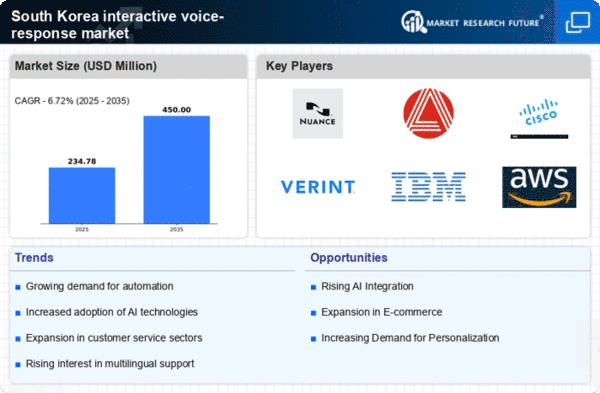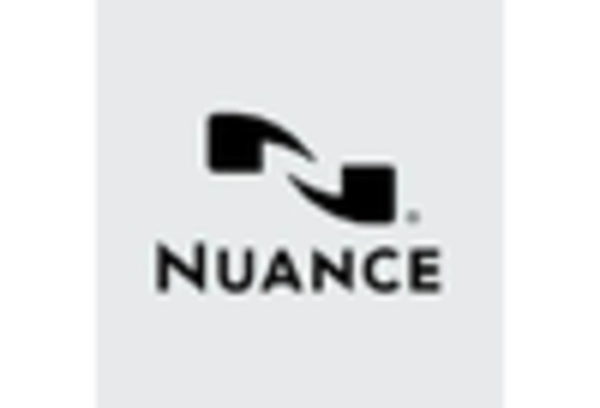Increased Adoption of Cloud-Based Solutions
The shift towards cloud-based solutions is significantly influencing the interactive voice-response market in South Korea. Organizations are increasingly migrating their operations to the cloud, which offers scalability, flexibility, and cost-effectiveness. This transition allows businesses to deploy interactive voice-response systems without the need for extensive on-premises infrastructure. As of 2025, it is estimated that over 60% of new interactive voice-response implementations will be cloud-based. This trend not only reduces operational costs but also enhances the ability to integrate with other digital platforms, thereby driving growth in the interactive voice-response market.
Expansion of E-commerce and Digital Services
The rapid expansion of e-commerce and digital services in South Korea is significantly impacting the interactive voice-response market. As more consumers turn to online shopping and digital platforms for services, businesses are compelled to adopt interactive voice-response systems to manage customer inquiries efficiently. This shift is evident in the reported 30% increase in online transactions over the past year, prompting companies to enhance their customer support capabilities. The interactive voice-response market is thus likely to benefit from this trend, as organizations seek to provide timely and effective assistance to their customers in a digital-first environment.
Growing Focus on Data Security and Compliance
As the interactive voice-response market expands in South Korea, there is an increasing focus on data security and compliance with regulations. Businesses are becoming more aware of the need to protect customer data and ensure compliance with local laws. This heightened awareness is driving investments in secure interactive voice-response systems that incorporate robust security features. Companies that prioritize data protection are likely to gain a competitive edge, as consumers are more inclined to engage with businesses that demonstrate a commitment to safeguarding their information. This trend is expected to bolster the interactive voice-response market as organizations seek to enhance their security measures.
Technological Advancements in Voice Recognition
The interactive voice-response market is experiencing a surge due to rapid advancements in voice recognition technology. In South Korea, the integration of artificial intelligence and machine learning algorithms has significantly enhanced the accuracy and efficiency of voice recognition systems. This improvement allows businesses to provide more personalized and responsive customer service, which is crucial in a competitive market. As of 2025, the market is projected to grow at a CAGR of approximately 15%, driven by the increasing demand for automated customer interactions. Companies are investing heavily in these technologies to streamline operations and reduce costs, indicating a robust future for the interactive voice-response market.
Rising Demand for Customer Experience Enhancement
In South Korea, the interactive voice-response market is being propelled by a growing emphasis on enhancing customer experience. Businesses are increasingly recognizing the importance of providing seamless and efficient customer interactions. As consumer expectations evolve, companies are adopting interactive voice-response systems to ensure quick resolution of inquiries and complaints. This trend is reflected in a reported 20% increase in customer satisfaction scores among organizations that have implemented such systems. The interactive voice-response market is thus positioned to thrive as businesses prioritize customer-centric strategies, leading to greater investment in these technologies.

















